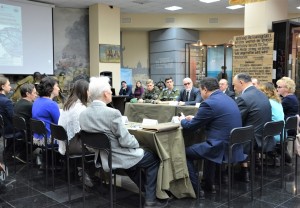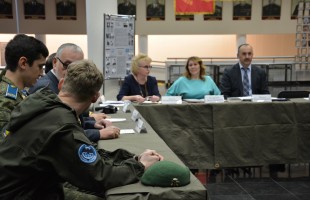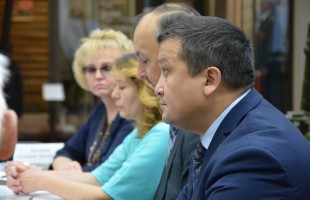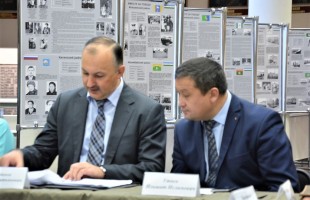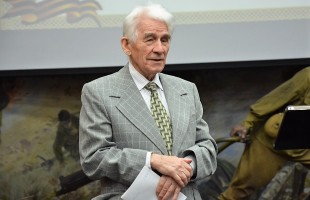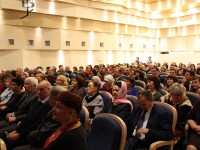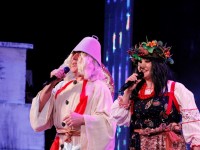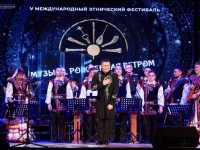A round table on the theme “The role of the resistance movement in liberating Europe from Nazism” was held in Ufa
Today, December 12, the round table “The Role of the Resistance Movement in Emancipating Europe from Nazism”, devoted to the 80th anniversary of the national liberation antifascist movement, was held in the Republican Museum of Military Glory.
The round table was organized by the Center for Humanitarian Studies of the Ministry of Culture of the Republic of Bashkortostan, the Republican Museum of Military Glory, the Regional Branch of the Russian Military Historical Society in the Republic of Bashkortostan, the Autonomous Non-Commercial Organization for the Development of Socio-Cultural Initiatives Center for Intercultural Interaction and the Bashkir Regional Branch of the Russian Society “Knowledge ".
Representatives of government authorities, cultural workers, scientists and educators, activists of public associations and organizations of the Republic of Bashkortostan took part in the round table.
The head of the department of the Ministry of Culture, Aigul Zulkarnayeva, welcomed the participants of the round table and read a welcome address on behalf of the Minister of Culture of the Republic of Bashkortostan, Amina Shafikova.
The Minister of Culture of the Republic of Bashkortostan, Amina Shafikova, said in her greeting: “Today our common task is to educate young people in the spirit of patriotism, to preserve the integrity of society based on the preservation of the historical continuity of generations. To achieve this goal, it is necessary to ensure that the younger generation has a correct understanding of the culture and history of their country, their people. So that every person in the republic would know and be proud of the glorious pages of the history of Russia, Bashkortostan, and honor the memory of the heroes.
The Second World War is the most brutal and bloody in the history of mankind - a very complex and multifaceted phenomenon, filled with events that changed the face of the World. It is no coincidence that these six years of history attract the attention of all new historians and researchers. One of the important military topics is the activity of national-patriotic forces in the countries occupied by the German fascist troops.
Participants in the Resistance movement, who were representatives of various social strata, used a variety of forms and methods of struggle and made a significant contribution to the victory of the countries of the anti-Hitler coalition. The Soviet Union provided a variety of assistance to the Resistance movement in many countries: it sent specialists to deploy guerrilla warfare, supplied the anti-fascist forces with weapons and medicines, and means of agitation, including through the Comintern.
An important feature of the Resistance movement was its international character: representatives of various nations united for a single goal - the independence of their homeland.
We admire all those who, not sparing their lives, defended the Fatherland, whose heroism at all times became a source of inspiration and an example of patriotism for future generations”.
Marat Mardanov stressed that this round table is another attempt to return to descendants the forgotten names of the heroes "in the shadow" who conquered the world for all nations, this is an opportunity to resist attempts to rewrite and falsify the history of the Second World War. As Russian President Vladimir Putin noted, these attempts are aimed at undermining the authority and strength of modern Russia. He stressed that at present there is an "impudent vilification" of a whole generation of people who have defended peace on earth.
During the round table, questions were raised about studying the history of the Second World War, the history of participants in the anti-fascist resistance movement and the partisan movement, the underground struggle in the former USSR and in Europe from the Republic of Bashkortostan. The Ufa period of the Executive Committee of the Comintern and the Comintern radio station, the secret reconnaissance schools of the Comintern located in Ufa and the village of Kushnarenkovo of the Kushnarenkovo district of the Republic of Belarus were also reviewed, and the role of graduates of the Kushnarenkovo intelligence school in the organization of the Resistance movement in Eastern Europe was highlighted.
Fragments of the films “Seventeen Moments of Spring”, “Black General” of the film company “Wright”, a film about Richard Sorge, a report by Sergey Brilev “Fitin returns to history” were shown.
An exhibition of copies of archival documents on the history of the Comintern from the funds of the Russian State Archive of socio-political history and other Russian archives, including the National Archive of the Republic of Bashkortostan, many of which were recently declassified, was also presented to the participants of the round table.
The participants of the round table spoke against the unlawful revision of the events of the Second World War and World War II and expressed support for the ongoing policy to counter the falsification of history.




